#mitri raheb
Text
Gaza's Gethsemane
Today is Maundy Thursday, when Christians remember Jesus’s Last Supper, his final meal with his closest friends before his arrest and execution by the Roman Empire.
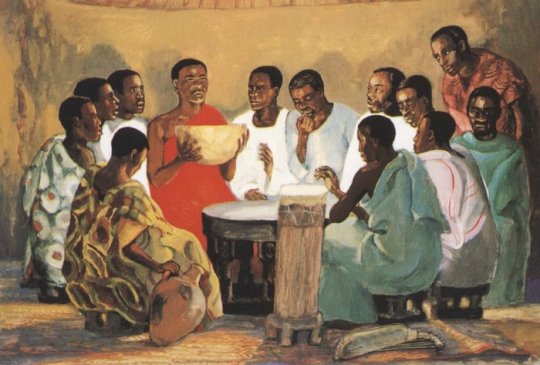
Meanwhile, right now, in Jesus’ own homeland, millions suffer starvation and terror, displacement and death under Western-funded Israeli colonialism and continued military assault. Israel blocks food from reaching them, leaving Palestinians in fear that any "supper" they can scrounge up might be their last.

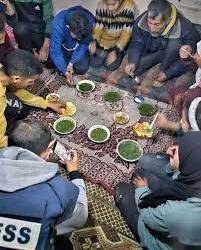
After their meal, Jesus led his friends into the Garden of Gethsemane, where he prayed in anguish, fearing all he was about to endure: criminalization, torture, and a painful public death.

Jesus begs his friends to “stay awake” as he wrestles — just to be present, to make him feel a little less alone. How do we respond to Jesus’ plea by “staying awake” to Palestine’s current agony?
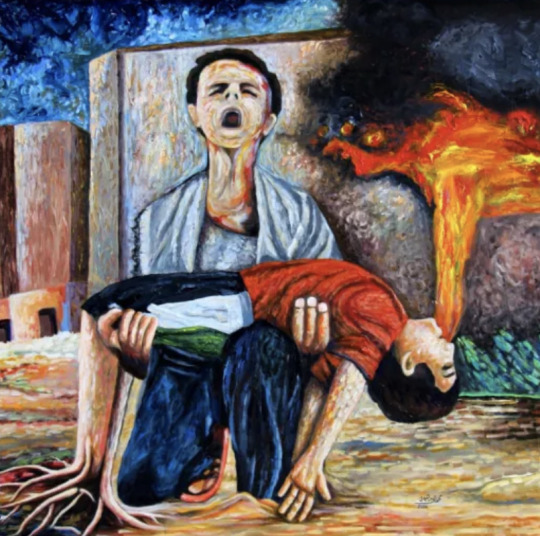
"Cry" (2016) by Mohammed Almadhoun.
That question also leads me to ponder another: how does God join Palestinians in their agony? Where is God in their suffering?
Palestinian Christian Mitri Raheb seeks to answer this question of where God is in his 2015 book Faith in the Face of Empire.
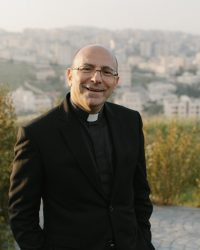

Raheb looks at the history of the Palestinian region, from ancient times to today, as a long chain of different empires — from the Assyrians to the Romans, Ottomans to Western-funded modern Israel.
He says that this long history of occupation is what gave Palestinians the ability to notice God where those in power do not: among the powerless. It is this revelation, Raheb declares, that has empowered Palestinians — Jewish, Christian, and Muslim — to survive and resist Empire again and again.
Raheb writes about how in ancient times, the divine was made
“...visible and omnipresent in the empire with shrines and temples that represented not only his glory but also that of the empire. God’s omnipotence and that of the empire were almost interchangeable. He was a victorious God, a fitting deity for a victorious empire.
At the other end of the spectrum there was the God of the people of Palestine, whose tiny territory resembled a corridor in Middle Eastern geography. ...This God was a loser. He lost almost all wars, and his people were forced to pay the price of those defeats. In short, this God did not appear to be up to the challenge of the various empires. His people in Palestine were forced to hear the mocking voices of their neighbors who taunted them, 'Where is your God?' (Ps 42: 3, 10).
The revelation the people of Palestine received was the ability to spot God where no one else was able to see him. When his people were driven as slaves into Babylon, they witnessed him accompanying them. When his capital, Jerusalem, was destroyed and his temple plundered, they saw him there. When his people were defeated, he was also present. The salient feature of this God was that he didn’t run away when his people faced their destiny but remained with them, showing solidarity and choosing to share their destiny.
Consequently and ultimately, Jesus revealed this God on the cross, in a situation of terrible agony and pain, when he was brutally crushed by the empire and hung like a rebellious freedom fighter. The people of Palestine could then say with great certainty [that their God] ‘in every respect has been tested as we are’ (Heb 4:15).
For the people of Palestine this meant that defeat in the face of the empire was not an ultimate defeat. It meant that after the country was devastated by the Babylonians, when everything seemed to be lost, a new beginning was possible. Even when the dwelling place of God was destroyed, God survived that destruction, developing in response a dwelling that was indestructible. And when Jesus cried on the cross, “My God, my God, why have you forsaken me?” (Mk 15:34), that soul-rending plea was just the prelude to the resurrection…”
It is this revelation that God sides against empire, Raheb continues, that keeps the Palestinian spirit alive through horrible oppression. Though the world may call such faith foolish — how can you believe God is with you and that God will have the final say, when all evidence points to your abandonment and defeat? — it is wisdom to the oppressed. Raheb describes how this wisdom feeds Palestinian resistance, over and over across the millennia:
The art of survival and starting anew is a highly developed form of expression in Palestine, and one I see daily. People’s lives, businesses, and education are interrupted by wars and the aftermath of wars over and over again, and yet I witness people refusing to give up, taking a deep breath, and beginning again. Logically, it is foolish, and yet there is deep wisdom in such a course of action.
I’m often asked by visitors how I can keep going. Everything seems to be lost, the land “settled” by Israel, the wall suffocating Palestinian land and spirit, the world silent, and hope almost gone.”
Raheb's answer to them is that God’s presence in and among the suffering, and God’s promised resurrection, of renewal in the face of all terror and death, is what keeps him and his people going.
As we enter into these final days of Lent, I pray for hearts and minds opened to witnessing God’s solidarity with and resurrection for Palestinians suffering imperial brutality. I pray that the Palestinians will survive as they always have — “afflicted in every way, but not crushed; perplexed, but not driven to despair; persecuted, but not forsaken; struck down, but not destroyed” (2 Cor 4:8–9).
93 notes
·
View notes
Text
The prevailing paradigm used in media and academia to describe events in Palestine/Israel is that of a conflict—a conflict between two peoples, a conflict over land and resources and, as Raheb writes, “a conflict over holy places deeply connected to identity.” But the designation conflict and the reality of occupation—even the charge of apartheid—fall short in describing the root of the situation, according to Raheb.
In the book’s first chapter, he argues “for a new framework and a paradigm shift,” insisting that “the situation prevailing in Palestine since the Balfour Declaration is one of settler colonialism” which, acknowledging the work of other scholars, he describes this way:
The permanent settlement of colonists in an occupied land is the main feature… The settler colonialists establish and enforce state sovereignty and juridical control over the indigenous land, ultimately aiming to eliminate the native people. The natives become extraneous while the settlers are cast as natives through different political mechanisms, ideological constructs, and social narratives. The indigenous land is described as terra nullius, empty or barren land that is just waiting to be discovered, thus becoming the private property of the settlers. The native people are depicted with racist constructs as savage, violent terrorists, while the settlers are portrayed as the civilized and brave pioneers. To defend the settled property from the savage, a police state is created and is granted extraordinary power over the native people….
Raheb’s contribution to the literature on settler colonialism grows out of his recognition that scholars writing about settler colonialism have not been trained in theology and, hence, haven’t thought to examine how over the centuries the Bible has been used as a significant justification for settler colonialism.
Decolonizing Palestine fills this void, bringing Palestinian Christian theology to the study of settler colonial theory for the first time. Raheb demonstrates how, as he writes, “Christian theology has played a role in almost all settler colonial projects, including North America, South Africa, and Australia.”
55 notes
·
View notes
Text
𝓣𝓱𝓮 𝓑𝓲𝓫𝓵𝓮 𝓘𝓼 𝓝𝓸𝓽 𝓪 𝓑𝓪𝓽𝓸𝓷 [Book Review]
A Palestinian pastor throws an intellectual hand grenade into the body of knowledge on Palestine/Israel.
By Sam Bahour
Read at: Medium and CounterPunch
2 notes
·
View notes
Text
Deutsche Ministerpräsident gibt BDS-Hassprediger aus Bethlehem €30.000
NGO Monitor: Pastor „wirbt für theologischen Antisemitismus“
Benjamin Weinthal, Jerusalem Post, 15. April 2023
Palästinenser gehen an einem Schild vorbei, das zu einem Boykott Israels aufruft; es ist auf eine Mauer in Bethlehem gemalt. (Foto: AFP PHOTO)
Der Vorsitzende der Grünen in Baden-Württemberg, Winfried Kretschmann, übergab Ende März persönlich einen Scheck über €30.000 an einen…

View On WordPress
0 notes
Text
Christmas Cancelled in Bethlehem
Last week, Christian church leaders in the city of Bethlehem announced the cancellation of traditional Christmas festivities in the place traditionally associated with the Jesus’ birth.
And this for at least two obvious reasons. For one, the genocidal killings by colonial settlers in Palestine’s occupied West Bank have made it impossible for tourists to come to Bethlehem.
For another,…
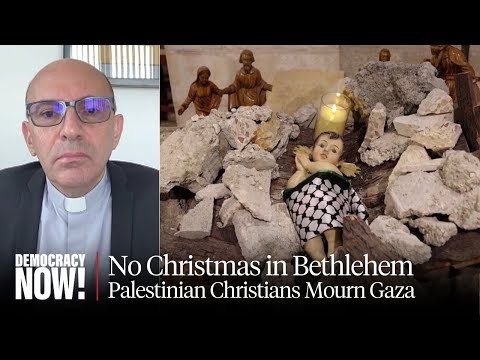
View On WordPress
#"Democracy Now"#Amy Goodman#Bethlehem#Christmas#Dar al-Kalima University#Gaza#Genocide#Genocide Joe Biden#Liberation theology#Rev. Isaac Munther#Rev. Mitri Raheb#Sabeel Liberation Theology Centre
2 notes
·
View notes
Text
The Christmas story, as we read it in the Bible, is a Palestinian story par excellence.
Because it talks about a Palestinian Jewish family from the north, from Nazareth, who's ordered by the empire of that time, the Romans, to evacuate the north and to go to the south, to Bethlehem, which is what the people in Gaza today are actually experiencing.
The story of Mary, a pregnant woman is the story of 50,000 pregnant women in Gaza who are on the run, they are in labor but they have to find refuge and you know they give birth outside in a tent, and so Jesus is born as a refugee like all these kids that are born today in Gaza.
– Palestinian Reverend and Professor, Dr. Mitri Raheb
9K notes
·
View notes
Text
"The outcome of the 1967 war gave a boost to Jewish religious nationalism and to 'messianic' extremist Jewish groups within Israel, who started settling in the West Bank, claiming it as ancient Judea and Samaria. The combination of Judea and Samaria was not so much a geographical description as a religious claim with a political agenda. A process of 'Judeaization' of the country soon began, with settlers building Jewish settlements on every tel that had a biblical connection. The occupation of the West Bank, Gaza, and East Jerusalem also greatly benefited Israeli archeologists, who shifted their focus to the West Bank, in general, and to Jerusalem and the Temple, in particular. Consequently, in the course of the last forty years, a gargantuan theft of antiquities has occurred, emptying Palestine of its archeological treasures and destroying many of those seen as 'non-Israelite.'"
Mitri Raheb, Faith in the Face of Empire: The Bible Through Palestinian Eyes (2012)
keep this in mind when zionists claim there's "no Palestinian archeology." and keep in mind that every "Israeli" artifact is Palestinian archaeology; every artifact in occupation museums is a part of Palestinian (Jewish and non-Jewish) history
466 notes
·
View notes
Text
Dr. Mitri Raheb draws parallels between Jesus’ refugee birth in Bethlehem and the harsh reality facing Gaza’s newborns today. In the shadow of political turmoil, over 8,000 children pay the price for power, echoing a tragic tale that transcends two millennia.
59 notes
·
View notes
Text
I discuss this in full, with additional notes and graphics here on my Instagram.
The Israel-Palestine conflict genocide is perhaps the most unabashed human rights violation of the twenty-first century. As a muslim and an Indonesian, I believe this isn't a religious matter, but a matter of neocolonialism
I want to discuss it from the perspective of decolonization as put forward in the works of Pastor Rev. Mitri Raheb of the Evangelical Lutheran Christmas Church in Bethelhem.
Mitri Raheb explores the impact of colonialism on Palestinian society and offers insights into strategies for decolonization. Raheb argues that the colonization of Palestine has not only affected the political and territorial aspects of the conflict but has also deeply impacted the cultural, social, and religious identity of the Palestinian people. He emphasizes the importance of decolonization as a process that goes beyond political independence to encompass the restoration of Palestinian identity, history, and cultural heritage. It highlights the need for a holistic approach to decolonization that addresses the multifaceted dimensions of the Palestinian experience.
Mitri Raheb's work on "Decolonizing Palestine" advocates for the liberation of Palestine based on the historical injustices inflicted by colonialism, which have led to the suppression of Palestinian identity and rights. He argues that decolonization is essential to address these injustices and restore Palestinian sovereignty, emphasizing the importance of reclaiming Palestinian heritage and resisting ongoing colonial practices. He underscores the moral imperative of decolonization, advocating for a just resolution to the Israeli-Palestinian conflict that respects human rights and ensures the dignity of the Palestinian people.
When talking about the liberation of Palestine, it must go hand in hand with the Decolonizing of Palestine. It goes beyond the return of territorial sovereignty. It is a return of the history, culture, and heritage of the Palestinian people.
"The occupation of Palestine is not just about land, it's about the suppression of an entire people's identity and existence."
— Rev. Mitri Raheb.
27 notes
·
View notes
Text
𝐉𝐞𝐬𝐮𝐬 𝐰𝐚𝐬 𝐛𝐨𝐫𝐧 𝐚𝐬 𝐚 𝐫𝐞𝐟𝐮𝐠𝐞𝐞 »
In these challenging times, I wonder how much has changed over the last 2000 years.
Certainly, the identity of the oppressor has shifted, from Romans to Israelis.
What else?
Gaza is the most bombarded place in history.
A truly multinational genocide perpetrated in the contemporary way of doing business: financed by the US, armed by the US, with mercenaries coming from all parts of the New American Empire (and its EU colonies). Including from Ukraine. How ironic?
On this Christmas Eve, I ponder what Jesus Christ would have thought about people committing massacres against a defenseless civilian population.
What would Jesus have thought about those collaborating with and defending war criminals?
And what would Jesus have thought of his modern-day followers celebrating his 2023rd birthday while turning a blind eye to the plight of his fellow Palestinians?
Merry Christmas ~
The Christmas story is a Palestinian story par excellence. It talks about a family in Nazareth in the north of Palestine that is ordered by imperial decree of the Romans to evacuate to Bethlehem and go there to register - and this is exactly what the people in Gaza have been experiencing these past 75 days.
Mary, the pregnant woman, is on the run, exactly like the 50,000 pregnant women in Gaza who are now displaced.
Jesus was born as a refugee. There was no place for him to be born so he was put in a manger. This is exactly what newborn babies in Gaza are now experiencing.
The bloodthirsty Herod ordered the murder of all children so he could stay in power. Today, 8,000 children in Gaza have been murdered so Netanyahu can stay in power.
And the angels declare "glory to God in the highest peace on earth". This was a critique of the empire because glory belongs to the All Mighty and not the mighty. And the peace that Jesus came to proclaim is not the peace of pax-romana - a peace based subjugation and military operation - but rather a peace based on human dignity, equality, and justice.
Hear it directly from Reverend Mitri Raheb in Occupied Bethlehem.
#merry christmas#dont stop talking about palestine#share if you agree#boycott puma#boycott zara#israel are the real terrorists#war criminals#zionistterror#satanyahu#mustshare#sharethis#must watch#pray for palestine#free palestine#i stand with palestine#end genocide#ceasefire#boycott israel#pray for gaza
13 notes
·
View notes
Text
Decolonizing Palestine (2023) by Mitri Raheb: a Palestinian Christian’s call for a theological paradigm shift
As I dig into various responses to Israel’s colonization of Palestine, this book has become my top recommendation for Christians.
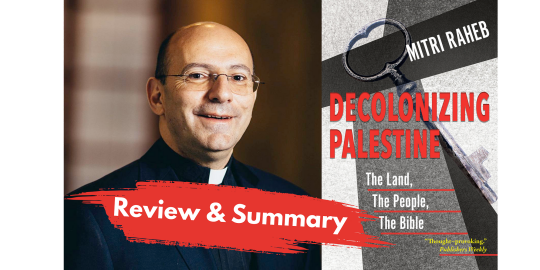
Lutheran pastor Dr. Mitri Raheb (b. 1962) is Palestine’s most widely published Christian theologian. His latest text, Decolonizing Palestine: The Land, the People, the Bible, could hardly have been more timely, coming out just a few months before the events of October 7, 2023.
If you are Christian — or are otherwise interested in unpacking how Christian theology has fueled Israeli settler-colonialism, and what Christian theology that centers and supports the Palestinian cause might look like — I strongly urge you to read the book in full. But if you don't have the time or inclination, I've published a Medium article that provides a thorough summary of his book.
Click here for the full review & summary of the book; what follows below the is a much briefer summation of Raheb's main points:
Western Christian theology today is dominated by Christian Zionism, all forms of implicitly endorse the oppression of Palestinians.
While conservative forms of Christian Zionism, with their focus on Israel’s supposed role in the Second Coming, tend to be centered, Raheb proposes a definition of Christian Zionism that reckons with “liberal” forms of Christian Zionism as well.
His definition emphasizes action over belief: “I argue that Christian Zionism should be defined as a Christian lobby that supports the Jewish settler colonialism of Palestinian land by using biblical/theological constructs within a metanarrative while taking glocal considerations into account.”
A paradigm shift is urgently needed in Christian theology, one that applies the lens of settler colonialism to our biblical interpretation.
Of the book’s four chapters, much of the first two focus on presenting Palestinian history through this lens, successfully arguing that modern Israel is a settler colonial state funded by Western powers:
“Today, empire is bigger than one state, nation, or military power. …Israel is part of this empire and is sustained by it” with both the “hardware” of military weapons, and the “software” of “a biblical blueprint that paints colonial practices with theological justifications of a ‘promised land’ and ‘chosen people.’”
To move towards a decolonial theology, our two hermeneutical keys are the land and the native people of Palestine. Understanding Palestine as:
the name of the “multiethnic, multicultural, and multireligious region that was able to include diverse identities and peoples within its boundaries” for the past 2,500 years; and
a land on the margins of “five regional empires that have determined its fate” for millennia,
we come to recognize that the voices lifted up in the Bible are colonized voices, those who are oppressed by and who resist Empire.
This lens helps us understand the theme of chosenness or “election” as well:
in Deuteronomy, Isaiah, and elsewhere in scripture, “Election was and will always be…a promise to those weak and powerless, to those who begin to despair about themselves. …It is with a notion like election that the people of Palestine were able to face the diverse imperial occupations throughout millennia.”
Therefore, the appropriation of the concept of election by various imperial powers, from the British Empire to the United States to modern Israel, is completely contrary to its biblical significance.
That sums up Raheb’s main points in Decolonizing Palestine; for more information, go read his book — or read my full article over on Medium!
#decolonizing palestine#mitri raheb#palestinian christians#palestinian theology#christian zionism#free palestine#books#essays
25 notes
·
View notes
Text
We search for God on this land. Theologically, philosophically, we ask: Where is God when we suffer? How do we explain his silence?
But away from philosophy and existential questions. In this land, even God is a victim of oppression, death, the war machine, and colonialism. We see the Son of God on this land crying out the same question on the cross: My God, my God, why have you forsaken me? Why do you let me be tortured? Crucified?
God suffers with the people of this land, sharing the same fate with us. As Mitri Al-Raheb wrote in his article “Theology in the Palestinian Context,” which appeared in an Arabic book I edited:
“As for the God of this land, he is not like all the gods... His land is plowed with iron... His temples are destroyed by fire ... His people are trampled underfoot, and He does not move a muscle. The God of this earth is hidden from view. You search for His traces but do not see them. You long for Him to split the heavens and come down to see. To listen, to be compassionate, to be saved. The God of this land does not repel brutal armies, but rather shares one fate with his people. His house is demolished. His son is crucified. But his mystery does not perish. Rather, he rises from the ashes, and with the refugees you see him. He walks, and in the dark of the night he raises springs of hope. Without this God, Palestine remains a scorched land ... it remains a field of destruction. But if God tramples its foundations, he will only make it a holy land, a land in whose hills the good news of peace resounds.”
Beloved, in these difficult times let us comfort ourselves with God’s presence amid pain, and even amid death, for Jesus is no stranger to pain, arrest, torture, and death. He walks with us in our pain.
God is under the rubble in Gaza. He is with the frightened and the refugees. He is in the operating room. This is our consolation. He walks with us through the valley of the shadow of death.
1K notes
·
View notes
Quote
We American Christians are naive in our understanding of what’s happening in the Middle East. And we American Christians are naive in our understanding of what happened to the First Nations where we live. We can do better. We have to at least try to understand each other.
Reading Mitri Raheb on Indigenous Peoples’ Day
11 notes
·
View notes
Text
This Christmas, I won't be celebrating as God's children in Palestine are facing a horrible genocide and Christmas can't even be properly celebrated in Jesus's birthplace. If you also find yourself struggling right now, or simply want to learn more about the situation in Palestine through a Christian perspective during this holy season in the religion, i highly recommend if you haven't already checking out the following notable Palestinian Christian resources
Rev. Dr. Munther Isaac, a Palestinian pastor in Bethlehem
youtube
Sabeel and its North American branch Friends of Sabeel
Rev. Mitri Raheb of the Christmas Church in Bethlehem
youtube
who has written many books!!!
Lina Abu Akleh, niece of the martyred Palestinian-American Christian journalist Shireen Abu Akleh
Given that Lina is also Armenian which she briefly mentions in the linked article, I'd like to dedicate some space in this post to those from the Indigenous, Armenian state of Artsakh who have been displaced in their recent ethnic cleansing from the region at the hands of Azerbaijan and with the help of Israel. As Armenian Christians (among the oldest Christians in the world) traditionally prepare to celebrate Christmas on January 6th, you can consider sparing some extra holiday cash to AGBU, or simply taking the time to educate yourself on the plight of Armenians whether they be from Artsakh or reside within the Armenian quarter of the Old City in Jerusalem where they also face age old struggles
And to further combine this shared struggle of Palestinians and Armenians at all times of the year and throughout history you can also check out A Palestinian Armenian: The Intertwine between the Social and the Political by Varsen Aghabekian w/ a foreword from aforementioned Rev. Raheb
Anyone else with some more additions please feel free to include them in the notes. No matter what faith you come from or not at all, please keep these vulnerable people in your thoughts this Christmastime, and may God bless them all 🧡
9 notes
·
View notes
Text
This is an important piece of news. One hopes this challenges the right-wing Scofieldite views that majorly influence US foreign policy.
0 notes
Text
Ring the bells of peace for now and the future

The Pope used his sermon at Midnight Mass to offer his solidarity with people in the Middle East and to condemn the "futile logic of war".
Pope Francis told 6,500 people inside St Peter's Basilica: "Our hearts are in Bethlehem, where the Prince of Peace is once more rejected by the futile logic of war".
As Jesus Christ stated: “I am the way and the truth and the life. No one comes to the Father except through me.”

"The bells of Bethlehem ring for a ceasefire in Gaza"…"The deaf international community must hear our voice." - Bethlehem's Mayor Hanna Hanania
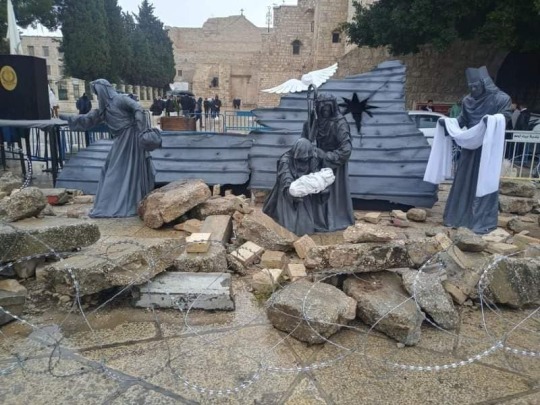
"We have to stop theses hostilities and turn the page because violence generates only violence." - Latin Patriarch of Jerusalem, Pierbattista Pizzaballa

"Bethlehem gave Jesus to the world and it's high time for the world to give Bethlehem and Gaza peace." - Mitri Raheb, a pastor from the Gaza Strip
#manchester#iraq#iraqi#london#uk#baghdad#liverpool#hussein al-alak#scotland#usa#pope francis#bethlehem#middle east#jordan#egypt#israel#palestine#gaza#current events#edinburgh#politics#bbc news world#bbc news home#journalism#protest#reuters#cbc#articles#al jazeera#vatican
1 note
·
View note